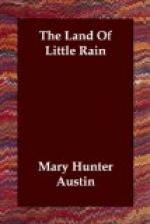One looks for these to begin again when once free of the rifted canon walls; the high note of babble and laughter falls off to the steadier mellow tone of a stream that knows its purpose and reflects the sky.
OTHER WATER BORDERS
It is the proper destiny of every considerable stream in the west to become an irrigating ditch. It would seem the streams are willing. They go as far as they can, or dare, toward the tillable lands in their own boulder fenced gullies—but how much farther in the man-made waterways. It is difficult to come into intimate relations with appropriated waters; like very busy people they have no time to reveal themselves. One needs to have known an irrigating ditch when it was a brook, and to have lived by it, to mark the morning and evening tone of its crooning, rising and falling to the excess of snow water; to have watched far across the valley, south to the Eclipse and north to the Twisted Dyke, the shining wall of the village water gate; to see still blue herons stalking the little glinting weirs across the field.
Perhaps to get into the mood of the waterways one needs to have seen old Amos Judson asquat on the headgate with his gun, guarding his water-right toward the end of a dry summer. Amos owned the half of Tule Creek and the other half pertained to the neighboring Greenfields ranch. Years of a “short water crop,” that is, when too little snow fell on the high pine ridges, or, falling, melted too early, Amos held that it took all the water that came down to make his half, and maintained it with a Winchester and a deadly aim. Jesus Montana, first proprietor of Greenfields,—you can see at once that Judson had the racial advantage,—contesting the right with him, walked into five of Judson’s bullets and his eternal possessions on the same occasion. That was the Homeric age of settlement and passed into tradition. Twelve years later one of the Clarks, holding Greenfields, not so very green by now, shot one of the Judsons. Perhaps he hoped that also might become classic, but the jury found for manslaughter. It had the effect of discouraging the Greenfields claim, but Amos used to sit on the headgate just the same, as quaint and lone a figure as the sandhill crane watching for water toads below the Tule drop. Every subsequent owner of Greenfields bought it with Amos in full view. The last of these was Diedrick. Along in August of that year came a week of low water. Judson’s ditch failed and he went out with his rifle to learn why. There on the headgate sat Diedrick’s frau with a long-handled shovel across her lap and all the water turned into Diedrick’s ditch; there she sat knitting through the long sun, and the children brought out her dinner. It was all up with Amos; he was too much of a gentleman to fight a lady—that was the way he expressed it. She was a very large lady, and a long-handled shovel is no mean weapon.




